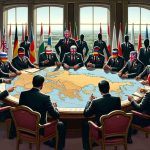In a surprising turn of events, it has been reported that North Korean troops have joined Russian forces in Ukraine, adding a new dynamic to the ongoing conflict. The Pentagon estimates that up to 12,000 North Korean troops are now part of the operations in Ukraine, particularly in the Kursk region where key territorial battles are taking place.
United States Secretary of State Antony Blinken has issued a stern warning in response to this development, emphasizing that North Korea’s involvement demands a firm response. The specifics of this response have not been disclosed, but it underscores the seriousness of the situation.
The addition of North Korean troops further complicates the already complex situation in Ukraine, heightening tensions and raising concerns about the escalation of the conflict. Their presence alongside Russian forces indicates a significant shift in the geopolitical landscape of the region.
As the conflict intensifies with renewed Russian attacks on Kyiv, Ukrainian authorities, led by President Volodymyr Zelensky, remain resolute in their determination to defend the country’s sovereignty. Despite facing heavy losses, Ukraine continues to prepare for continued resistance against Russian aggression.
The uncertainty surrounding future U.S. policy towards Ukraine, especially with the impending change in leadership, adds another layer of complexity to the situation. Allies and supporters of Ukraine are closely monitoring developments to understand how the new administration will approach the ongoing crisis.
New Developments: North Korean Troops Join Russian Forces in Ukraine
In a recent twist of events, additional information has surfaced regarding the presence of North Korean troops in Ukraine, fighting alongside Russian forces. While the initial reports estimated around 12,000 North Korean troops involved, recent intelligence suggests a higher number, with some sources indicating up to 20,000 troops engaged in the conflict.
Key Questions and Answers:
1. Why have North Korean troops joined Russian forces in Ukraine?
This cooperation between North Korea and Russia in Ukraine raises questions about the motives behind this alliance. While the exact reasons remain unclear, it is speculated that North Korea may be seeking to gain strategic advantages or resources through this partnership.
2. What are the implications of North Korean involvement?
The presence of North Korean troops in Ukraine introduces a new dynamic to the conflict, potentially altering the power dynamics in the region. This collaboration could have far-reaching consequences for not only Ukraine but also the international community.
Challenges and Controversies:
1. International Response:
The international community faces the challenge of responding effectively to the combined forces of North Korean and Russian troops in Ukraine. Coordinating a unified response while navigating diplomatic sensitivities presents a significant hurdle.
2. Humanitarian Concerns:
The influx of North Korean troops into the conflict raises concerns about potential human rights violations and the impact on civilians caught in the crossfire. Addressing these humanitarian challenges amidst the ongoing conflict poses a complex dilemma for stakeholders.
Advantages and Disadvantages:
Advantages:
– Enhanced Military Capabilities: The collaboration between North Korean and Russian troops could bolster their collective military strength and capabilities, potentially influencing the outcome of the conflict.
Disadvantages:
– Escalation of Conflict: The addition of North Korean forces may escalate the conflict in Ukraine, leading to further violence and instability in the region. The involvement of an additional foreign power complicates the resolution of the crisis.
For further updates on the evolving situation in Ukraine, stay informed through reliable news sources.
Suggested Related Link: U.S. Department of State

